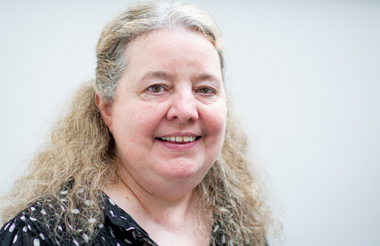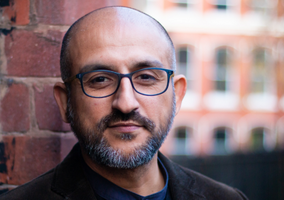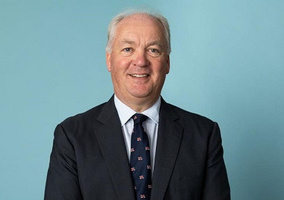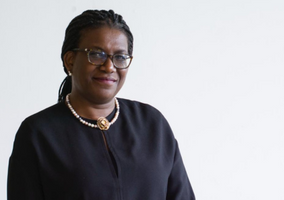Though she had never seen herself as a charity leader, Caroline O’Connor has since changed her mind.
After joining Migrant Help in March 2017 as chief operating officer and becoming interim chief executive in September 2019, she took on the permanent role in January 2020.
O’Connor moved into the charity sector after around 20 years in finance in the private sector. She was “feeling frustrated making people who made a lot of money more wealthy, and not doing something that felt like it was contributing to the greater good”.
She moved to Wide Horizons charity “and from there, I was really hooked”.
“I moved on to work at a children’s hospice [Richard House Children’s Hospice] and then on to Migrant Help. So, I’ve stayed in the charity sector, and it’s much more gratifying and fulfilling.”
O’Connor has taken what she learnt in the private sector “about the rigours around finance and policy and good process” and applied it to the charities for which she has worked.
On joining Migrant Help, she says: “I like charities that support underdogs. I moved to the UK in 1996 from Philadelphia. We have the Rocky films and that history of the underdog struggling.”
Migrant Help supports around 100,000 asylum seekers each year, several thousand survivors of modern slavery, and several hundred people with refugee status.
O’Connor felt Migrant Help sat outside the charities that “people felt a lot of compassion for, wanted to help or donate money to or support”.
“I was really moved by the cause, by the people who would come over to the UK and would be trying to escape war and persecution and violence and rebuild a life. I saw that as a way to help people that other people might not be as willing to help.”
A reluctant leader
O’Connor says she never saw herself leading an organisation and that speaking now as CEO is “really uncomfortable” for her.
“I’m not a social person, so I always liked being the number two in organisations, and I had done that in the private sector, and then in charity work.”
When the previous CEO left, Migrant Help's trustees asked her to step up and manage things while they went through the recruitment process. A few months after, they asked her to stay in the role.
On whether she would have ever applied for a CEO role, O’Connor says: “Absolutely not, and I hadn’t seen a CEO like myself. Most CEOs I worked with, both in the private and charity sector, were male; and they were very confident and took up the whole room, bold kind of people.
“I couldn’t see myself in that way. And I was fine with that. I didn’t have ambition to be that. But I’ve changed my mind: I don’t think you have to be that way.”
Practice has helped, and though she is still somewhat uncomfortable with public speaking, she says: “I think that’s okay, because our staff are seeing that you don’t have to be the traditional, blustery salesman to be successful as a CEO. It’s around compassion and heart and emotional intelligence, and that’s just as important.
“You can do things that you don’t like to do, or that you’re not comfortable doing, and you can do them very authentically.”
O’Connor says her staff know she does not like public speaking and “we work together to get our messages across and talk about things”.
“It helps people who, like me, find it difficult to find their voice. So, I think it’s worked out okay. It’s still not easy after five years of doing it, but I’m getting more used to it.”
Supporting staff to ‘be who they are’
O’Connor took on the CEO role months before the first Covid-19 lockdowns in the UK.
“It was really difficult, because there’s nobody you could ask how they would have done it, or how they did it,” she says.
“But that also was incredibly helpful, because even if you did it wrong, nobody had a way to have done it better.
“We had a really supportive board, but I found a huge amount of pressure as new CEO with a reshaped senior management team (SMT). Here I was to support people not knowing what I was doing yet.”
She asked the trustees if they could each pair up with one of the SMT “so I didn’t feel as alone in the responsibility for people”.
Since then, O’Connor has tried to support all the charity’s staff “to be leaders of a different style”, meaning that they “can be whoever they are, and that the system allows them to be who they are”.
“Whether somebody is shy or outspoken or neurodivergent or has any sort of complexity to themselves, they can be really successful.”
O’Connor’s original SMT have all stayed since she took over as CEO, with more members recruited. She says it is reassuring “that people are engaged, that they’re enjoying what they do, that they’re growing, and that they’re challenged in their jobs”.
On her own future plans, O’Connor says: “I’m pretty far along in my career for a first-time CEO. I’d probably like to see out my career with Migrant Help.”
‘Difficult conversations’
O’Connor says the refugees with whom Migrant Help works “know better than anybody else what it is that they need”.
“What we’re trying to do is put in place a really person-centred service that’s of a really good and consistent quality.
“So, we try and get away from that need to decide what’s best for them, and we engage really closely with a lived experience advisory panel.”
The charity has a trustee who was a service user and several others who have experience in the immigration and asylum systems. “They can tell us what it is they need and help us make decisions that are more relevant to what’s required,” says O’Connor.
There are also people with lived experience of the asylum system in Migrant Help’s workforce, O’Connor says, “so we have more diversity within our personnel”.
“We make sure we have space to talk about issues,” she says.
“I think one really key thing is to be able to be comfortable with the idea about being uncomfortable, and so we accept the fact that difficult conversations will sometimes be had, and it’s okay to make mistakes and talk through those mistakes that people have made and try to learn more and understand better.”
Contract uplifts ‘variable’
O’Connor has seen Migrant Help increase its income increase sharply during her tenure, after the Home Office awarded it a 10-year £235m contract in 2019 to provide advice and support to asylum seekers.
Since the contract award, the charity has seen its income more than quadruple from £11m to £45.7m in the year to March 2023, £30m of which came from the Home Office.
The Kent-based charity is also commissioned by the Scottish and Northern Irish governments and a county council.
“Our income has increased significantly over the past few years. A lot of that is attributable to the pandemic that slowed down the asylum process, but it is variable, depending on the number of people seeking asylum, victims of modern slavery, or people seeking use of settlement,” says O’Connor.
“We also have a subsidiary company called Clear Voice that provides interpretation and translation services.”
Whether the charity receives uplifts to its contracts in the cost-of-living crisis has been “variable”, she says.
“It depends on who the contract is held by. Our largest contract does have an indexation clause which helps support against the inflationary pressures that we’ve been feeling.”
‘Choosing our campaigns wisely’
Migrant Help, along with other charities, has drawn criticism from some groups for campaigning on refugee rights while serving a government contract.
O’Connor says managing the relationship between having government contracts and campaigning can be a delicate balance and that her charity is very mindful of what it campaigns about – “it is a matter of choosing our campaigns wisely”.
However, she says it is important for charities like Migrant Help to campaign “because very few people or organisations are as close to the people that we support as the charities are, on the frontline. supporting them”.
“People working in charities have a really good understanding of the challenges that people are facing, and if not us, who is speaking for people who are generally voiceless and need that support?
“We have been subject to criticism for sharing our opinion about different matters in the past, but we need to be able to do that.
“It is one way you build trust with your clients – if you’re willing to speak for them when they don’t get listened to, where they don’t have the opportunity or the platform to share an opinion about what needs to be done. It’s one of the important things about the work of our lived experience advisory panel.
“We also are able to influence the commissioning bodies, government bodies, by how policy is put into operation. So, we are able to talk to them and explain the impact of certain activities that take place, and if they persist in a certain way, what might happen.
“So, in that way, we can campaign by sitting at the table across from them and putting things into place. That’s incredibly helpful and can be really powerful to help support clients with real-world problems that they’re facing.”
O’Connor says her charity wants to change public perceptions of refugees, as “a lot of social media and some politicians make a real point of demonising the people that we support”.
“If we can highlight people that we support and their abilities and the skills that they bring into the country, public perception will improve, and there will be better decision-making from the government.”
O’Connor hopes to see less “victim blaming within government” as well as safer routes for migrants and a change in the law so asylum seekers are able to work in the UK.
Related Articles












